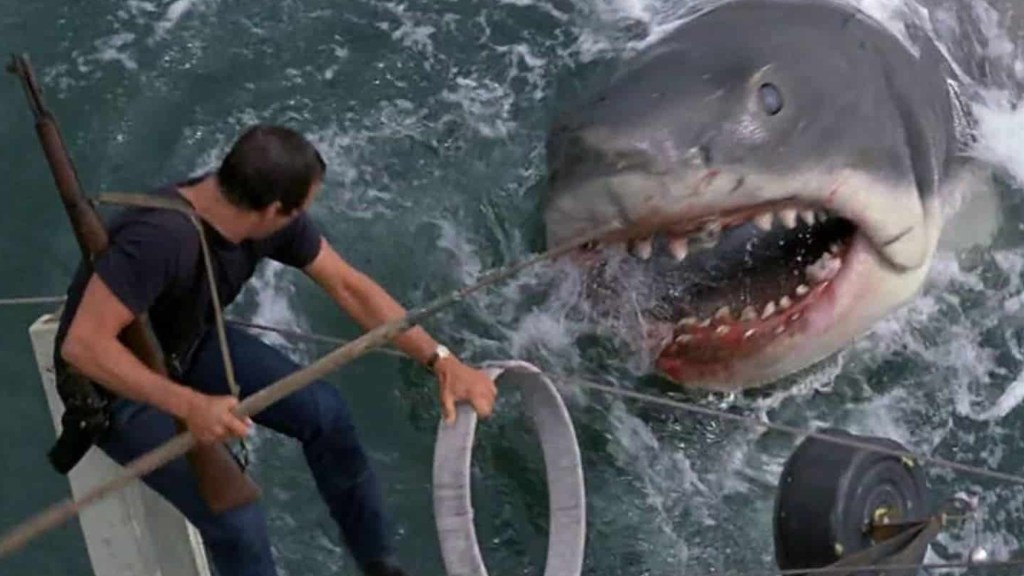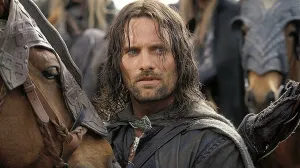Steven Spielberg crafted an ending for 1975’s Jaws that diverges heavily from Peter Benchley’s namesake novel, and it ended up being the right call. Set on the summertime seaside tourist town of Amity Island, Jaws sees the town’s upcoming Fourth of July holiday turn into a local panic when a great white shark arrives in the town’s waters and begins devouring local swimmers. Roy Scheider’s police chief Martin Brody joins forces with marine biologist Matt Hooper (Richard Dreyfuss) and fisherman Quint (Robert Shaw) to stop the shark’s rampage, with the trio finding themselves in a harrowing high-seas battle against the aquatic predator.
Videos by ComicBook.com
Jaws became the biggest box office success of its time (albeit one that gave sharks an undeservedly bad reputation), and one tool that helped make that possible was the movie’s ending and, specifically, Brody’s method of defeating the shark. Compared to the shark’s death in Benchley’s novel, the ending is far more cinematic and quite literally explosive in the movie. It should come as no surprise that Steven Spielberg, well-known as one of the first filmmakers associated with summer blockbusters through Jaws, was the one to push for it.
Jaws Has Very Different Endings in the Novel & Movie

When Brody, Hooper, and Quint embark on their sea-faring hunt for Amity Island’s shark menace, it plays out much darker in the novel. To begin with, Hooper himself meets a terrible end in his efforts to hit the shark with a bang stick from an underwater cage, with the shark devouring Hooper whole. Quint then becomes even more obsessed with defeating the shark, to the point of not even caring about being paid for his services anymore, and this ultimately costs him his life when he becomes entangled in a rope attached to a harpoon, pulled into the depths with the shark like Captain Ahab. Shortly thereafter, Brody is just inches away from being devoured by the shark when the greatly fatigued fish stops literally dead in its tracks, mortally wounded from the barrels harpooned into it and other injuries from the long battle at sea, and sinking to the ocean floor.
The film version of Jaws alters these events significantly, beginning with Hooper surviving his underwater battle with the shark and hiding behind a coral reef. After the shark leaps aboard the Orca and devours the screaming Quint, Brody tosses an oxygen tank into the shark’s mouth. As the fish makes its final charge towards the sinking Orca, Brody shoots at the shark with a rifle and manages to hit the tank, causing the tank to burst and the shark to explode from the suddenly released compressed air. Hooper then returns to the surface, with him and Brody swimming back to Amity Island together on some of the remaining barrels. The night and day difference between these two endings ended up being a matter of debate between Steven Spielberg and Peter Benchley.
Why Spielberg Wanted to Alter the Ending of Jaws

When it came to how to end Jaws the movie in the cinematic way possible, Steven Spielberg laid out his proposed ending to Benchley involving Brody tossing an oxygen tank into the shark’s mouth and shooting it. While Benchley initially found Spielberg’s proposed ending to be absurd and over-the-top, Spielberg argued that believability was far more important than realism in a cinematic context. Ultimately, Benchley would have a change of heart and came to see Spielberg’s ending as the ideal way to go for Jaws in movie form.
Speaking to ComicBook for Jaws @ 50, Peter Benchley’s widow Wendy shared how her late husband came to be in favor of Spielberg’s ending for Jaws, stating, “That was absolutely fine with him because he realized, in a novel, you need to have more complexity as people read, but when you have a movie, you need a straight A-B-C-D plotline.” Benchley also stated that her husband didn’t quite see eye-to-eye with Spielberg on the size of the great white shark, with such sharks being about 15 feet long in nature as opposed to the 25-foot length of the shark in Jaws. Nonetheless, Benchley stated her feelings, “Steven is so talented and brilliant and he knew he needed to have a bigger shark to make that movie grab you and really make you afraid.”
Ultimately, the size of Jaws‘ shark and its explosive demise proved to be highly beneficial to Jaws as a movie.
Why Spielberg Was Right About Changing the Ending of Jaws (& the Size of the Shark)

While Benchley’s spine-tingling novel portrays the shark as a terrifying, man-eating beast from the deep, books also inherently leave far more to the reader’s imagination than any movie can afford to do. Such is the case with the shark itself being so much more of a beefed-up, high-seas predator in Jaws. Even with Spielberg keeping the shark off-screen for much of the movie (due to the infamous malfunctioning of the mechanical shark in Jaws‘ horribly troubled production), the shark still had to appear on-screen sooner or later. By making the great white shark of Jaws very abnormally large, Spielberg really sold the fish as a terrifying threat to all of Amity Island’s residents and tourists.
Additionally, while the demise of the shark in Benchley’s novel works well as the finale to the dark, suspenseful tale Benchley relates, the shark simply passing out and drowning right before devouring Brody would have been highly anti-climactic in Jaws the movie after the bloody carnage the shark unleashes throughout the film. With Spielberg’s ending, Jaws ends on a note of not just survival but victory over the shark after it has taken so many lives. Moreover, Jaws’ literally explosive ending was also instrumental in the movie’s role in establishing the modern summer movie season, Spielberg’s ending giving Jaws a real climactic impact that it would not have had with the ending of Benchley’s novel.
In the end, the two endings of Jaws serve their purpose for their respective mediums well, Benchley’s ending of Brody escaping a near-brush with death and Spielberg’s of Brody triumphing over the seemingly insurmountable shark, with the added bonus of Hooper also surviving. 50 years later, the decision to go with Spielberg’s ending was one that helped shape the identity and enduring legacy of Jaws.









